SEO and business blog
Read about SEO, digital marketing, website optimisation, check out case studies and learn more about how I run my business!
BrightonSEO September 2023: AI, making friends and sustainability
Fresh from BrightonSEO 2023, I dive into the conference's hottest topics from AI's growing role in SEO to the vital importance of sustainable practices and networking. Read on to discover key insights and actionable takeaways that can elevate your SEO game.
I’ve returned from my 8th participation in the BrightonSEO conference, definitely the sunniest one yet! 😎 Having the conference this early after Summer feels like a small continuation of holidays, with the beach and the ginormous seagulls. But hey, I wasn’t there just to enjoy the lovely weather, but also to keep on track with what has been going on in the SEO industry, and make new friends.
Setting the Scene: The Evolution of AI in SEO
In the past year, AI has been the main topic of discussion in the industry. From ChatGPT to Bing, Bard and the Search Generative Experience, the past few months have been dense with new features, techniques and speculations.
I was wholly expecting AI to be a primary topic for this edition, and I was not mistaken. A lot of talks were about AI this time around and it’s interesting to see how the conversation is shifting.
Why BrightonSEO Is Crucial for an International SEO Consultant
So, why do I keep coming back to BrightonSEO? As a one-woman operation, it's my responsibility to stay updated for both myself and my clients. Whether it's listening to experts or having face-to-face chats with them, this is where I find the golden nuggets of information that I can directly apply to my client projects.
Typically, Digital PR is not my specialty, and I was able to get some amazing insights from Jo O’Reilley on the topic for a client of mine. In the midst of the conference I also had to send out an important proposal draft for a big project, and was able to exchange with other independent consultants to improve my initial draft.
Key Themes and Trends: AI, Sustainability, and More
This time around, the conference offered a variety of topics. Sustainability in SEO was one topic that particularly caught my attention. The discussion around environmentally-friendly practices in SEO is not only necessary but aligns with my values as well.
Another focus was on business development specifically for consultants, offering actionable advice on how to grow our practices a stressless way.
I was also invited to participate in a freelance roundtable where we discussed common challenges and solutions in our line of work.
These sessions added layers of depth to my understanding of where the industry is headed and how my daily work can have a positive impact.
Meeting and making friends
This edition was primarily about meeting friends and colleagues or making new friends, than about attending all talks. Thanks to the power of replay, I got to dedicate time to having deep conversations, sometimes way deeper than expected! From the struggles of freelancing to celebrating wins, it’s amazing for me to be able to connect authentically with people who share the same vision of SEO.
More importantly, the networking / friendship opportunities extend beyond the conference. They lead to long-term professional relationships. The insights and feedback I received from peers are invaluable, especially when dealing with big client proposals and strategic decisions.
Learning and Takeaways: Practical Knowledge for Immediate Use
Several talks and workshops were incredibly impactful. Alice Rowan's presentation about creating authentic content provided actionable advice and additional resources for further reading. Another session about measuring SEO sustainability by Ellie Connor offered insights that I can immediately include in my SEO strategies.
The talk on SEO forecasting by Hannah Rogers introduced a straightforward framework, providing me with another tool to better serve my clients.
Lastly, the keynote by Professor Hannah Fry helped me better understand the importance of interpreting data on a large scale.
Impacts and Next Steps
My takeaway from this year's BrightonSEO is twofold: One, although the introduction of AI into SEO can seem overwhelming, we are all learning and adapting together. Two, the SEO community is diverse and abundant with opportunities for everyone.
In terms of next steps, my focus will be on maintaining the valuable relationships I've built and integrating the new tools and strategies I've learned into my work.
To sum up, BrightonSEO September 2023 was a comprehensive learning experience. The conference remains a crucial event for anyone in the SEO industry and is a catalyst for professional growth and meaningful connections. I’ll be back in April 2024 to find out if AI overlords have indeed taken over 😉
Check out my previous articles on BrightonSEO ↓
If you have questions or would like to discuss more about the future of SEO, I'm just an email away.
BrightonSEO April 2023: Diving into the Future of SEO and Embracing the Power of AI
Dive into the highlights and key takeaways from this year's BrightonSEO conference, as we discuss the evolving role of AI, the future of SEO, and the importance of diversity and inclusion within the industry.
It's that time of the year again, and I couldn't be more excited to attend my 7th BrightonSEO conference (IRL)! This event never fails to amaze me with its wealth of knowledge, networking opportunities, and of course, the classic fish'n'chips on the beach (if the seagulls don't have other plans). This time, I was particularly looking forward to diving deep into discussions around AI, the future of SEO, and international SEO strategies.
Let’s talk about my expectations
A lot (and I mean, A LOT) has happened in the past 6 months. AI took over our timelines and experimentations, Bing is… hype now (what ?!), it feels like every tech company is either working on a search engine or infusing AI just about everywhere.
Our job as SEOs is shifting, morphing in something more about Search Experience Optimisation than Search Engine Optimisation – good news, we won’t need to update the acronym.
I remember in October 2022, the chatter at BrightonSEO was a little bit about AI, and somewhat about the probability of Apple releasing a search engine. 😂 That feels like a lifetime ago!
This time around, I had the feeling AI would be more present in conversations, I also felt like we’d hear a lot about techniques to make websites lighter, load faster and more accessible to users. In general, I was very excited to learn more about international SEO, content strategies and ultimately, improving the user experience across the board.
Highlights from key talks
Here are a few highlights from the talks I attended as well as the links to the slides. Full disclosure, I couldn’t catch all the talks I wanted, and I am planning on watching quite a few replays, I’ll update this section as I catch-up!
- DAY 1 -
TikTok for search marketing by Rachel Pearson
I’m not a huge TikTok fan, but I was curious to learn a bit more with this talk.
TikTok is not the new Google. 😮💨
TikTok content can be indexed by Google but not embedded.
Consistency is key on the platform, and testing different optimisations is encouraged.
Stop writing SEO articles: templates content that ranks by Dale Bertrand
I’m considering using templates more in the SEO and content strategies I deliver to my clients. For me, this is about simplifying the content production process while making content that performs for users. Dale also shared a bunch of handy recipes to follow.
Consider templates like:
Collection Pages
Niche buying guides
FAQs, Niche calculators
Comparison content
etc.
Use datasets to create content, comparison pages, calculators. See government-issued data for ideas.
Google Bard, ChatGPT, the sky is falling and SEO is dead (again) by Simon Lesser
SEO is not dead.
Chats are another way to interact, and content should be future-proof.
Focus on content that can't be replaced with a summary.
Don't be a middleman - add value to your content.
- KEYNOTE -
The future of SEO: What the past decade can teach us about the next by Areej Abuali
Areej’s keynote was fascinating and very moving. I highly recommend you watch the replay, my few notes definitely don’t do justice to the journey she took us on with this keynote.
Leverage AI tools for more efficient SEO activities.
Investment in SEO will grow, as it becomes more cross-functional in companies.
Prioritize audience over Google - optimize for user discovery.
Create your own space.
- DAY 2 -
Value of feature snippets by Niki Mosier
Probably one of my favourite talks, I learned a lot and had loads of ideas for client projects!
Paragraph featured snippets dominate, followed by lists.
Quick wins are possible with feature snippets, which help with brand awareness.
Schema markup can help get feature snippets.
19% of all SERPs have featured snippets
77% of questions start with “why”
50% of mobile screen is covered by featured snippets
70% of articles in featured snippets are no older than 2-3 years
Google’s local knowledge panel - the CMS you never knew you had by Claire Carlisle
Research "sameAs" property in schema, "hasMap", and other schema properties for local SEO optimisation. 😉
conversations
BrightonSEO is as much about the talks than the conversations I have with fellow search professionals. I was half expecting to have loads of conversations about AI, but as it turned out, most of the chats I had were about freelancing. From figuring out how to operate as a freelance in SEO to pricing, using the right title on your badge, or managing client relationships, I think we covered everything!
I’ll update this section with any thought that tickled my curiosity during the chats, and numerous coffee breaks.
Reflecting on the future of SEO and the industry
This edition of the BrightonSEO conference left me with several thought-provoking takeaways about the future of SEO and the industry as a whole:
Diversity in SEO conferences is crucial 💙
A more diverse lineup and crowd lead to more balanced conversations and foster a sense of belonging that I find lacking in other contexts within the industry. Areej's keynote had me pondering the next decade and how our industry must become more open to better reflect the needs of users. Furthermore, the Women in Tech SEO gathering on the first day was, as always, highly engaging and work-focused. The exceptional expertise these women bring to the table is both outstanding and inspiring. I am so grateful to be part of this community, and more generally to be part of this industry. Our work has the power to have such a positive impact on the world!
The international SEO community is exceptional. People are friendly, open-minded, and relaxed. While I know this may only reflect my own network, I feel that my bubble is expanding for the better, with incredible individuals joining the fold.
AI has undoubtedly made its presence known in the SEO world 🚀
Many speakers incorporated AI into their presentations, emphasising that it is how it’s another tool for us to use. While AI won't replace us anytime soon, it can significantly aid our day-to-day tasks and help our clients. Personally, I actually feel in control when it comes to the AI topic, as I continuously research and test the new tools I can get my hands on. While I wasn't surprised by the speakers' insights, I did learn about some new tools and tricks to try out.
The future of the SEO industry is looking bright ✨
SEO is far from dead, and I find it thrilling to delve into the nitty-gritty of the field at conferences like BrightonSEO. I'm eager to see where the future takes us and how our industry will evolve. BrightonSEO provided a wealth of actionable ideas for me to implement immediately with my clients. This conference is always hands-on, and I came away with numerous valuable insights this time around.
BrightonSEO April 2022 recap, notes and slides
I can’t believe this was my 5th time at BrightonSEO (IRL). I don’t do many conferences, but this one is worthy enough for me to travel 1000+ km twice a year to hang out with fellow SEOs, learn tons, make new friends, and, of course, grab a fish’n’chips on the beach - if the seagulls don’t steal it from me!
I took loads of notes, and plan to catch up on the talks I couldn’t attend on the BrightonSEO video vault. Until then, here are a few excerpts of my notes, as well as useful links and resources.
Quality assurance
Goodbye SEO fuckups! Learn to set a quality assurance framework
Slides and talk by Aleyda Solis.
Notes:
85% of SEOs have one to two major SEO incidents each year
We generally spend more time fixing and improving than building stuff
It’s not only a matter of catching error faster but to prevent them too
SEO monitoring should be a part of a broader SEO quality assurance process:
Educate to prevent SEO mistakes
Validate to avoid launching SEO errors
Monitor
Technical SEO QA: shining a light on invisible work
Slides and talk by Myriam Jessier & Gianna Brachetti-Truskawa.
Always have a staging environment to test things on
Define what’s important for your QA:
Critical pages
User flows
Core functionalities
Questions to ask yourself: Is it crawlable? Is in indexable? Is it rank-worthy?
Make sure to communicate potential risks to the teams
What matters:
Do not overload with thousands of pages
GSC has a time delay, so keep it in mind for QA
Some QA checks must be manual
QA your code: canonicals, schema, and hreflang
Use a configuration file in Screaming Frog, so everyone does QA the same way every time
Be aware that each type of site has its own QA flavour
Some deployments are not done by humans: cron jobs, scripts, server updates
Brand vs SEO: how to win allies and influence brand guardians
Slides and talk by Becky Simms.
Use personas, even when you work on SEO
SEO and the brand both use the website as a vehicle, so there’s necessarily some overlap or collaboration opportunities between both fields
Fundamentals
Beyond the basics: 5 (or 10) Google Business Profile elements you might not know about but REALLY should
Slides and talk by Claire Carlile.
There’s now a “request a quote” feature in Google Business Profile, but it can show how your potential clients can get quotes from your competitors as well
In your local results tracking tools, include your competitors
UTM trackers in URLs are crucial in GBP
When you ask for reviews from your clients, give them ideas on what they could write about to avoid “empty” or boring reviews
Use Vision AI to check what Google sees in the pictures you add to your Google Business Profile. You want to make sure what Google sees reflects what you want your business to show.
Reporting
Freddy Krueger’s guide to scary good reporting
Slides and talk by Greg Gifford.
There’s an unconscious bias where clients don’t always trust digital marketers or SEOs. That means every time we get in touch with our clients we have to overcome the mistrust.
Your client came to you for a problem, and you provide a solution, so the solution needs to appear in the report. Clients want to know quickly if the stuff you do is working.
So the most important thing is to know what to put in your report.
You need to make it crystal clear that what you do matters. This is often as simple as:
Organic traffic
Leads
Organic leads
That’s all you need in the end and that can up be put in one page.
Customise reports to each client to speak to each clients goals. Use questions over jargon for headlines.
Keyword research
How to go after the long tail keywords (and why it matters!)
Slides and talk by Paola Didone.
For long tail keywords, instead of creating new pages for each, start by focusing on pages you already have. You can add a small paragraph on a category page with those long tail keywords and it will do the job for the most part.
Check what is already ranking for the keywords you are targeting
Look at the proportion of the search volume of the head term vs the long tail keywords volume. There’s more point to targeting a long tail keyword that represents 30% of the head search term volume than 0.5%
Effective zero-volume keyword research and why it’s important
Slides and talk by Mark Williams-Cook.
Interestingly, the content ideas AlsoAsked provides will likely have zero search volume.
70-80% of searches are long tail keywords
15% of searches are new
So by not focusing on these keywords, we are actually getting on just 15% of keywords.
It’s not because you have a very low search volume that you shouldn’t write about something. Think about intent volume instead of search volume.
Agency & Freelance SEO
Managing expectations with “impossible keywords”
Slides and talk by Jessica Maloney.
“Impossible keywords” are the ones where the SERP is dominated by a brand (ex. Chapstick) for example, the ones where the client wants to to rank for X without further explanation.
How to proceed with the client:
Understand why
Education
Data : it’s your backup to explain and show the client what’s possible, keyword difficulty metrics
Offer alternative keywords
Use your own data from Google Search Console
Eyes on the competition : when a client comes with a competitor and a keyword, they are often more annoyed by the competitor than by their own ranking for this keyword. So showing them what this competitor does will work better.
Explode your agency growth: be more you
Slides and talk by Nicole Osborn.
Blending in = invisibility
Home page should say :we know what your problems are and we know how to solve them”
Add call to action on the first screen of the home page
Your copy has to be super attractive, honey to a bee
Don’t be too vague on what you do great
Purple and blue themes are overdone
Stock images are boring
About page: have pictures of the people, not the building
Boring won’t get you on the best shortlists 😉
3 strategies to ditch boring:
Stand out brand values
Connect with stories: be noticed by more of your best fit clients, tell people about who you are and they will come
Show your personality
People want to work with people they like, and they will talk about you if they believe they’ve found a rare pearl
Future of Search
Web design for people and planet
Talk by Tom Greenwood.
Check out the Website Carbon Calculator
Practical step to make a website more efficient for everybody and the environment:
Do you actually need this bit of code or this image?
Images weigh way more than a thousand words
For simple stock photo pictures, is it really communicating useful information?
Blurring the edges of a photo where you have a subject in the center can reduce the size by 50%
WEBP files are 30% lighter than jpeg
Use SVG files and optimise them by hand because Illustrator adds extra information
Auto play videos burn through data and are detrimental to the environment and to people who don’t have access to a lot of data
Animated SVG are cool
System fonts are zero waste, like Times New Roman, Courrier New, and Arial
WOFF2 font files are lighter
Reuse styles rather than adding styles to improve CSS
Jquery for forms is heavy
MinimalGA for Google Analytics tracking is lighter than Google Tag Manager
Contextual ads over personalised ads -> example: have sports ad on a sports article
Test on Motorola Moto E6 or similar because that is the average of what users have worldwide
Use dark mode
Search in the Metaverse
Slides and talk by Kara Thurkettle.
Impacts on search:
Search what you see
Use AR
Try on clothes virtually so the user gets more information
Use these technologies to do product demos, people are searching more and more for AR related terms like “see flooring in my room”
The Metaverse changes the user journey, where the SERP becomes a 3D virtual street, or where the information provided to the user is even more personalised
Search intent
How to determine search intent for B2B
Slides and talk by Adriana Stein.
Buyer personas are as important up in B2B in B2C
The challenge for SEOs is to align search intent and purchase intent
B2B is more complicated than B2S in the purchase decision stage because you have multiple people deciding to make the purchase, so we need to understand whether the search intent is B2B or B2C, as well as understand what different buyer personas we will have to deal with.
Step 1: Streamline the buyer personas
It’s impossible to talk to people without knowing who they are
Update buyer personas regularly
Simplify it by categorising the personas
End users - the ones that use the product
Influencers - people who have a voice in the buying process
Decision makers - the ones that decide the purchase
Step 2: Keyword research and clustering
Check keywords by hand and look at what the SERP looks like
Depending on the results you’ll be able to tell if they are B2B or B2C queries
Step 3: Keyword map
Map keywords to each page/type of page
Use multiple keywords to describe one product, by tying it to different use cases, different contexts
One seed keyword, multiple related keywords
Step 4: Create content
Use seed keyword, determine what buying stage this refers to, create title, then h1 and body, repeat with another seed keyword.
This is just a quick summary of some of the talks I attended in person at the event. I haven’t mentioned the keynotes which were both incredible, or the talks I’ll catch up on in the BrightonSEO video vault.
If you want to check out all the slide decks from the event, SiteVisibility has them all listed here.
This is hands-down the best SEO conference I have ever been to, I already have my ticket for October 2022 and even pitched to talk! 🤞
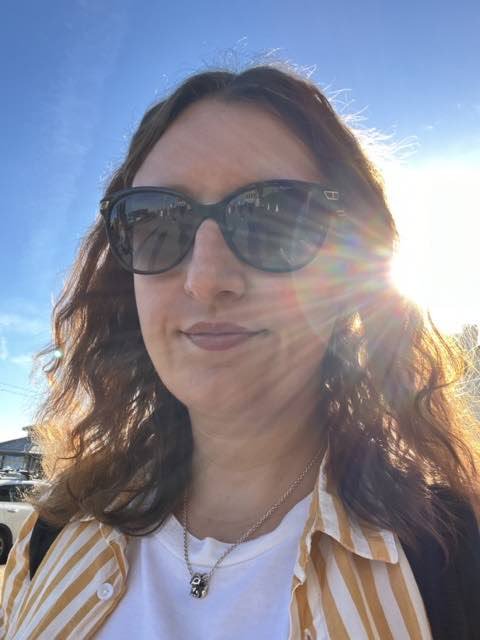
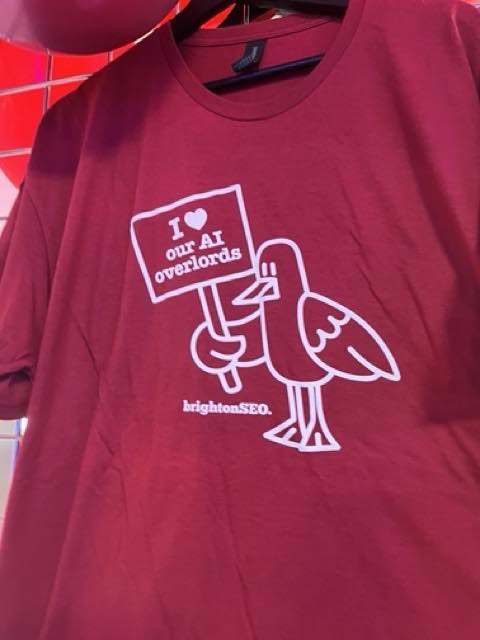
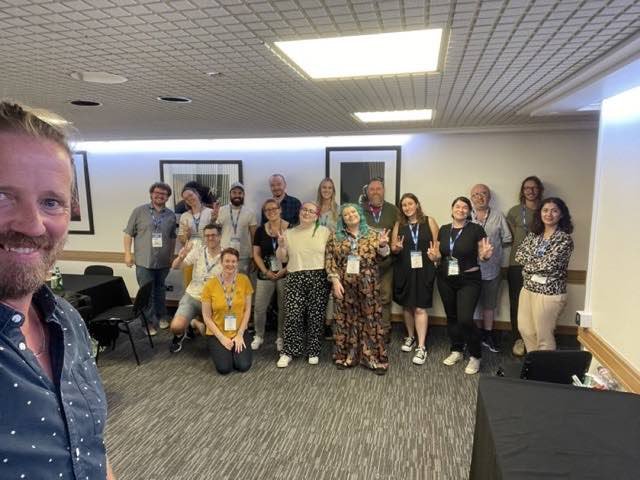
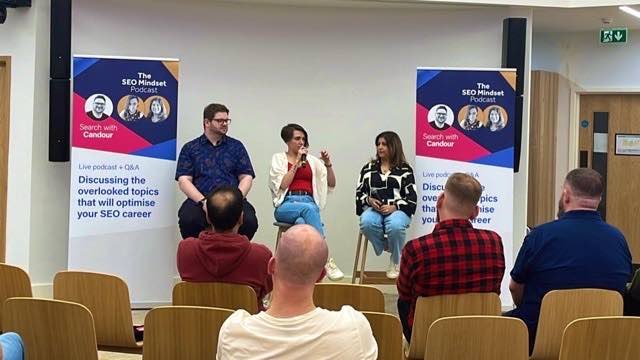
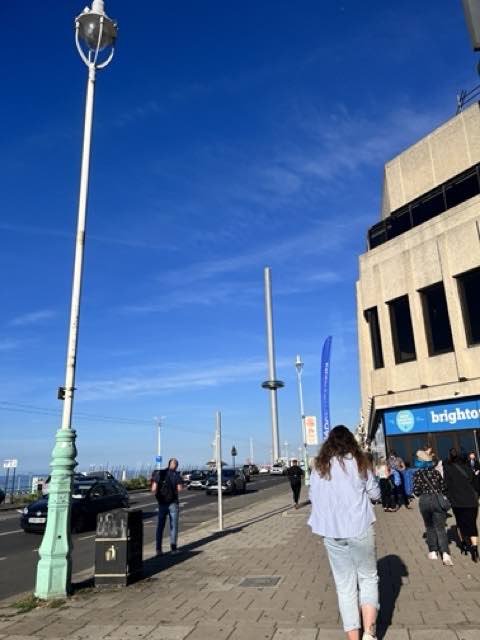
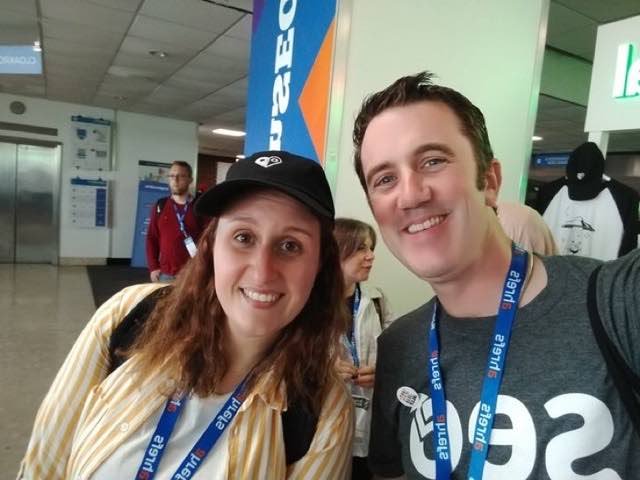
Fresh from BrightonSEO 2023, I dive into the conference's hottest topics from AI's growing role in SEO to the vital importance of sustainable practices and networking. Read on to discover key insights and actionable takeaways that can elevate your SEO game.